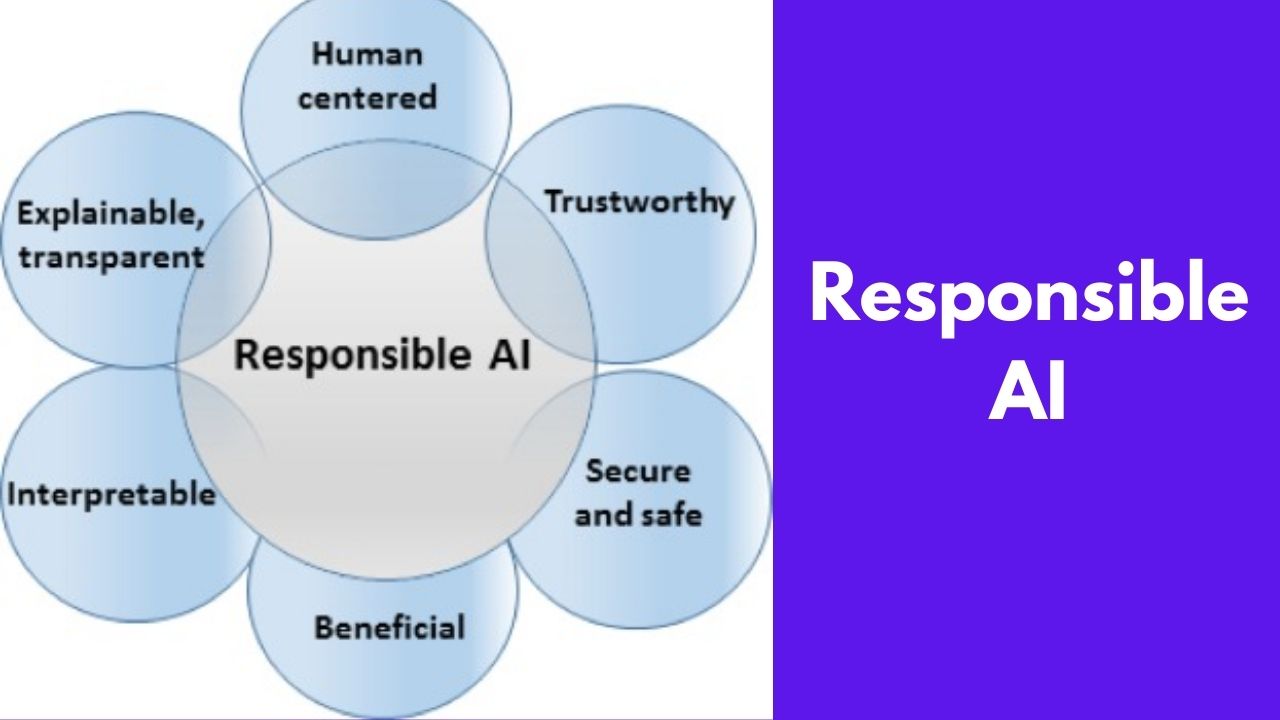
Responsible AI#
Introduction:#
Artificial Intelligence (AI) is rapidly transforming the way we live, work, and interact with the world around us. As AI systems become increasingly sophisticated and ubiquitous, it is more important than ever to ensure that they are developed and deployed in a responsible and ethical manner. Responsible AI refers to the principles and practices of developing and using AI in a way that is safe, transparent, accountable, and aligned with human values. In this blog post, we will explore the different aspects of responsible AI, including ethics, safety, transparency, accountability, and societal impact.
Salient Features of Responsible AI.#
Ethics: ensuring that AI systems align with human values and ethical principles, such as privacy, fairness, non-discrimination, and human dignity.
Safety: ensuring that AI systems do not cause harm or unintended consequences, such as through error or bias.
Transparency: making the workings and decision-making processes of AI systems understandable and explainable.
Accountability: holding individuals and organizations responsible for the actions of AI systems and their impacts.
Inclusiveness: considering and accommodating the needs and perspectives of diverse stakeholders, including underrepresented and marginalized groups.
Continuous improvement: continuously monitoring and improving AI systems to ensure they remain aligned with responsible AI principles.
Laws and regulations: Responsible AI involves compliance with relevant laws and regulations, such as data protection and privacy laws, anti-discrimination laws, and consumer protection laws.
Compliance: AI systems must be developed and deployed in compliance with industry standards and best practices for responsible AI, such as ethical guidelines set by professional organizations.
Accountable: Organizations must be accountable for the actions and impacts of their AI systems, and take steps to prevent harm and ensure that AI systems are acting in accordance with responsible AI principles.
Auditable: AI systems must be designed to be auditable, with clear and transparent record-keeping and reporting mechanisms in place, so that they can be monitored and evaluated to ensure they are acting in an ethical and responsible manner.
Incident planning: Organizations must have plans in place to respond to potential incidents or failures of AI systems, and to minimize harm to individuals and society.
Business impact: The deployment of AI must take into account the potential impact on the business, including risks and benefits, and ensure that AI systems align with the overall goals and values of the organization.
Security: AI systems must be designed and deployed with security in mind, to protect against malicious actors and ensure that sensitive data is not compromised.
Societal impact: The deployment of AI must consider the potential impact on society as a whole, including issues such as job displacement, economic inequality, and social justice. Organizations must take steps to minimize harm and maximize benefits to society, and engage in ongoing dialogue with stakeholders to ensure that AI systems are being used in a responsible and ethical manner.
Conclusion:#
The development and deployment of AI has the potential to bring about significant benefits to society, but it also presents risks and challenges that must be carefully managed. Responsible AI involves considering the potential consequences of AI systems and taking steps to minimize harm and maximize benefits. By ensuring that AI systems are ethical, safe, transparent, and accountable, we can build a future in which AI works for the good of all and helps to create a better world for everyone. The principles of responsible AI must be integrated into the design and deployment of AI systems from the very beginning, and must be continuously monitored and improved over time.
Resources#
You can find all these books, reports, presentations at this link.
- 10 Keys to AI Success in 2021-by-DataRobot-PPT.pdf
- 19 Slides on AI, AI-Ethics, and XAI - Murat Durmus-PPT.pdf
- 8 Ethics in Data Science_ Ensuring Responsible Data Use-Guide.pdf
- 9 Best practices every Data Science leader should follow-PPT.pdf
- A Collection of 10 free ‘Springer’ Books-LINKS.pdf
- A Framework For The Ethical Use Of Advanced Data Science in Humanitarian Sector-GUIDE.pdf
- A Guide for Ethical Data Science-GUIDE.pdf
- A guide to using AI in the public sector-GUIDE.pdf
- AI An Introduction to the Legal, Policy _ Ethical Issues-REPORT.pdf
- AI for Everyone-eBook.pdf
- AI, Human Rights, Democracy, and the Rule of Law-REPORT.pdf
- An Introduction to AI for Federal judges-eBook.pdf
- Artificial Intelligence for a Better Future- An Ecosystem Perspective on the Ethics of AI-BOOK.pdf
- Data Governance Clinic-REPORT.pdf
- Data Science Course for beginners-eBOOK.pdf
- Ethical Considerations and Statistical Analysis of Industry Involvement in ML Research-REPORT.pdf
- Ethics of Artificial Intelligence-CaseStudies.pdf
- Ethics _ Governance of Artificial Intelligence for Health by WHO-GUIDE.pdf
- Generative AI_ Perspectives from Stanford HAI-REPORT.pdf
- HAI_AI-Index-Report-2023_CHAPTER_1-Research-and-Development-REPORT.pdf
- HAI_AI-Index-Report-2023_CHAPTER_2-Technical-Performance-REPORT.pdf
- HAI_AI-Index-Report-2023_CHAPTER_3-Technical-AI-Ethics-REPORT.pdf
- HAI_AI-Index-Report-2023_CHAPTER_4-The-Economy-REPORT.pdf
- HAI_AI-Index-Report-2023_CHAPTER_5-Education-REPORT.pdf
- HAI_AI-Index-Report-2023_CHAPTER_6-1-Policy-and-Governance-REPORT.pdf
- HAI_AI-Index-Report-2023_CHAPTER_7-Diversity-REPORT.pdf
- HAI_AI-Index-Report-2023_CHAPTER_8-Public-Opinion-REPORT.pdf
- HAI_AI-Index-Report_2022-Master-REPORT.pdf
- Machine Learning Observability Checklist-REPORT.pdf
- Mindful-AI-Reflections-on-AI-Report.pdf
- National AI Strategies and Human Rights- A Review-REPORT.pdf
- National Artificial Intelligence Advisory Committee (NAIAC)-Report.pdf
- Policy Guide on AI for Children-GUIDE.pdf
- Problem Solving and Critical Thinking-GUIDE.pdf
- Regulate to Innovate-REPORT.pdf
- Responsible_Artificial_Intelligence-The_Cambridge_Handbook.pdf
- State of AI Report-PPT.pdf
- The AI Thought Book by Murat Durmus-PPT.pdf
- The Data Revolution_Big Data Open Data Infrastructures and Their Consequences-BOOK.pdf
- The Product Manager Handbook-BOOK.pdf
- Towards_Responsible_Data_Practices_for_Machine_Learning_in_India-Health_and_Agriculture-REPORT.pdf
- Understanding artificial intelligence ethics and safety-BOOK.pdf
- Understanding bias in facial recognition technologies-REPORT.pdf


Comments: